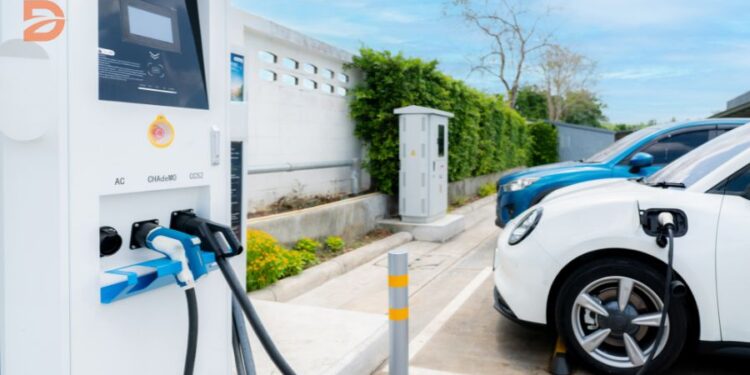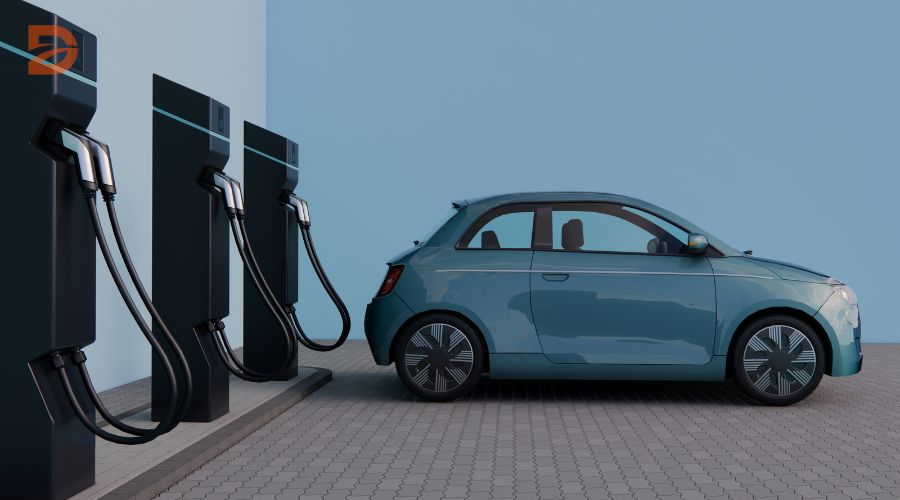With the electric vehicle (EV) market rapidly expanding, the choice of which electric car to buy has never been more overwhelming. Over two dozen automakers now offer combined 40-plus full-electric models boasting over 200 miles of range, unique high-tech features, and performance that outclasses comparable gasoline-powered models. The Biden-Harris administration’s ambitious plan to build 500,000 EV chargers nationwide, along with tougher EPA emissions standards and certain states’ plans to ban combustion cars as early as 2030, has further driven increased adoption and focus toward electric vehicles by the end of this decade.
This article will guide you through the current EV landscape and help you determine which electric vehicle is the best fit for your needs, whether you’re looking for a family SUV, a sleek sedan, or a rugged electric truck. We’ll explore the latest models, and analyze their range, charging capabilities, energy efficiency, cost of ownership, environmental impact, performance metrics, and safety features to help you make an informed decision.
Key Takeaways
- The electric vehicle market is rapidly expanding, with over two dozen automakers offering a combined 40-plus full-electric models with over 200 miles of range.
- The Biden-Harris administration’s plan to build 500,000 EV chargers nationwide and tougher EPA emissions standards are driving increased adoption of electric vehicles.
- This article will guide you through the current EV landscape and help you determine the best electric vehicle for your needs, considering factors like range, charging, efficiency, cost, performance, and safety.
- The Tesla Model 3 Standard Range, Hyundai Ioniq 5, Rivian R1T, Kia EV9, Tesla Model Y Long Range AWD, and Lucid Air are some of the top electric vehicles to consider in 2024.
- Factors like cost, environmental impact, and reliability should be weighed when choosing an electric vehicle that best fits your lifestyle and needs.
Understanding the Current EV Landscape
The electric vehicle (EV) market has witnessed tremendous growth in recent years, with a wide variety of options available for prospective buyers. Tesla’s Model 3 sedan and Model Y have emerged as the best-selling and most popular EVs, offering a desirable balance of performance, range, and access to the extensive Supercharger network.
Beyond Tesla, the EV landscape is becoming increasingly diverse, with other automakers introducing compelling models. The Hyundai Ioniq 5, Rivian R1T electric truck, Kia EV9 three-row SUV, Hyundai Kona Electric, BMW i7, Lucid Air, and Porsche Taycan are all notable examples that cater to different needs, from practical transportation to high-performance luxury.
Variety of EV Options Available
The EV market now offers a diverse range of models to choose from, catering to various budgets, preferences, and driving needs. Consumers can explore a wide selection of sedans, SUVs, trucks, and even high-performance sports cars, all powered by electricity.
| Model | Type | Range (miles) | Price (starting MSRP) |
|---|---|---|---|
| Tesla Model 3 | Sedan | 358 | $43,990 |
| Hyundai Ioniq 5 | Midsize Crossover | 303 | $39,950 |
| Rivian R1T | Electric Truck | 314 | $67,500 |
| Kia EV9 | Three-Row SUV | 290 | $49,795 |
| Lucid Air | Luxury Sedan | 520 | $87,400 |
This diverse selection of EV options allows consumers to find the perfect match for their needs, whether they prioritize range, performance, practicality, or luxury. The growing market competition and innovation in the EV space are driving advancements and making electric mobility more accessible than ever before.
Evaluating the Best Overall Electric Car
When it comes to electric vehicles (EVs), the Tesla Model 3 and Tesla Model Y stand out as the best overall options for most drivers. These two Tesla models offer an unbeatable combination of range, performance, and value, making them the go-to choices for those looking to make the switch to electric motoring.
The Tesla Model 3 and Tesla Model Y share many similarities, with the primary difference being the interior volume. Both models boast impressive driving ranges of over 300 miles on a single charge, allowing owners to complete a week’s worth of commuting or embark on long road trips with minimal stops for charging.
One of the key advantages of these Tesla models is their access to the Supercharger network, the most extensive and reliable DC fast-charging infrastructure in the United States. This ensures that electric car owners can easily recharge their vehicles during longer journeys, minimizing downtime and maximizing convenience.
| Model | Range (miles) | 0-60 mph (seconds) | MSRP (starting) |
|---|---|---|---|
| Tesla Model 3 | 358 | 5.8 | $43,990 |
| Tesla Model Y | 330 | 5.0 | $53,490 |
In terms of performance, both the Tesla Model 3 and Tesla Model Y deliver impressive acceleration, with the Model Y reaching 0-60 mph in just 5.0 seconds. This level of performance, combined with the instant torque delivery inherent to electric motors, provides a thrilling and engaging driving experience that can rival even the most high-performance gasoline-powered vehicles.
For drivers seeking the best overall electric car, the Tesla Model 3 and Tesla Model Y offer an unparalleled blend of range, performance, and accessibility, making them the top choices in the EV market today.
Electric vehicle comparison
When it comes to selecting the best electric vehicle (EV) for your needs, understanding the key features and capabilities of various models is crucial. From range and battery capacity to charging time and energy efficiency, the details can make a significant difference in your driving experience and overall cost of ownership.
Let’s take a closer look at some of the top electric vehicles on the market for 2024, providing a comprehensive comparison to help you make an informed decision:
| Model | Base Price (MSRP) | Effective Price* | Range (miles) | Battery Capacity (kWh) | Charging Time (0-80%) | Energy Efficiency (MPGe) |
|---|---|---|---|---|---|---|
| Tesla Model 3 Standard Range | $43,990 | $36,490 | 263 | 55 | 25 minutes | 134 |
| Hyundai Ioniq 5 | $39,950 | $32,450 | 303 | 77.4 | 18 minutes | 114 |
| Rivian R1T | $67,500 | $60,000 | 314 | 135 | 45 minutes | 75 |
| Kia EV9 | $48,995 | $41,495 | 280 | 77.4 | 25 minutes | 105 |
| Hyundai Kona Electric | $32,675 | $25,175 | 258 | 64 | 47 minutes | 120 |
*Effective Price includes available tax credits and incentives.
These electric vehicles offer a range of capabilities, from the long-range performance of the Rivian R1T to the impressive efficiency of the Tesla Model 3 Standard Range. By evaluating factors like cost, range, battery capacity, charging time, and energy efficiency, you can find the electric car that best suits your driving needs and budget.
Testing and Evaluating Electric Cars
Real-World Driving Experience
When it comes to electric vehicles (EVs), real-world driving performance is crucial. Our team of experts has extensive experience evaluating and driving hundreds of EVs over the last 15 years, from the compact 2012 Mitsubishi i-Miev to the impressive 516-mile Lucid Air Grand Touring. Our rigorous testing process involves covering over 200 miles on a mixed driving route, encompassing dense urban roads, long stretches of highway, and twisty mountain roads.
During these tests, we meticulously evaluate the EV’s DC fast charging speed and experience, as well as its driving dynamics, handling, acceleration, and braking performance. Importantly, we compare the real-world experience, tested range, and efficiency with the EPA estimates, providing our readers with a comprehensive understanding of the vehicle’s capabilities.
For instance, in a recent highway-speed range test involving 22 of the most popular new EVs, the Rivian R1T drove for 20 miles longer than its EPA-estimated range before shutting down, while the BMW iX traveled up to 30 additional miles after indicating zero range, surpassing other models tested. The Hyundai Ioniq 6 was driven until the battery was fully exhausted, covering an impressive 265 miles before being towed back to the test track.
Our testing process also includes evaluating the user-friendliness of the vehicle’s charging setup, including the navigation system, as well as the ease of plugging and unplugging the EV. We also assess the contribution of one-pedal driving to the overall driving experience, which is now a key factor in our road-test scores.
By combining our extensive real-world driving data with the latest research and advancements in EV testing, we strive to provide our readers with the most accurate and insightful information to help them make informed decisions when it comes to choosing the right electric vehicle.
Factors to Consider Before Buying an EV
When considering an electric vehicle (EV) purchase, there are several crucial factors to evaluate. From range and efficiency to charging capabilities and overall features, these elements can significantly impact the ownership experience.
Range and Efficiency
One of the primary concerns for EV buyers is the vehicle’s range, or how far it can travel on a single charge. Electric vehicles can provide a driving range of 200 to 400 miles, with some models even exceeding 400 miles. Efficiency, measured in miles per kilowatt-hour (mi/kWh) or kilowatt-hours per 100 miles (kWh/100mi), is another important metric that determines the cost of operation. EV range and efficiency are essential considerations for buyers to ensure their driving needs are met.
Charging Capabilities
The availability and speed of public and home charging options can greatly affect the EV ownership experience, especially for longer road trips. Home charging with a basic wall outlet can provide around 40 miles worth of charging overnight, while a 240-volt outlet can offer 25-30 miles worth of charging per hour. Charging capabilities are a crucial factor in determining the convenience and feasibility of EV ownership.
Features and Performance
In addition to range and charging, EV features and performance are essential considerations. Factors such as passenger and cargo capacity, cabin technology, safety features, and driving dynamics can all play a significant role in ensuring the EV meets the buyer’s needs. With a wide range of EV features and performance capabilities available, it’s important to carefully evaluate how the vehicle aligns with your specific requirements.
| Metric | Range | Efficiency | Charging Speed | Average Cost |
|---|---|---|---|---|
| Electric Vehicles | 200-400 miles | 3-6 mi/kWh | 25-30 miles/hour (Level 2) | $52,000 (new) |
| Internal Combustion Engine Vehicles | 300-500 miles | 20-30 mpg | N/A | $48,000 (new) |
Pros and Cons of Electric Cars
Buying an electric car has several key advantages, including the potential for long-term fuel savings, reduced maintenance costs, and available incentives and subsidies. Charging an EV’s battery at home can cost just a few dollars, resulting in significant savings compared to the cost of filling a gas tank. EVs also have fewer moving parts, which means fewer opportunities for things to break and reduced maintenance requirements.
Potential Fuel Savings
When considering energy efficiency, all-electric vehicles (AEVs) convert 59 to 62 percent of energy into vehicle movement, while gas-powered cars only convert between 17 and 21 percent. Improvements in battery technology allow AEVs to drive 100 miles while consuming only 25 to 40 kilowatt-hours of electricity. AEVs can travel about 43 miles for $1.00, significantly farther than gas-powered vehicles which can only travel around 10 miles for the same fuel cost.
Reduced Maintenance Costs
AEVs usually have higher upfront costs compared to gas-powered vehicles, but they generally require less maintenance and are less expensive to charge than fuel with gas. The cost of fully charging an electric vehicle like a Tesla is typically around $10 to $15, compared to over $40 for filling a gas tank. Switching to an electric vehicle can save the average driver between $1,500 to $2,000 per year in fuel costs, with potential savings of up to $4,500 for those regularly driving longer distances.
Available Incentives and Subsidies
To further encourage the adoption of electric cars, federal, state, and local governments offer a variety of incentives and subsidies. The federal EV tax credit can reduce tax liability by up to $7,500 for electric vehicle purchases. Additionally, some states like New Jersey and Rhode Island provide their own EV incentives, offering up to $5,000 and $2,500 respectively for qualifying vehicle purchases.
Conclusion
The current electric vehicle (EV) landscape offers a diverse range of options for prospective buyers, catering to various needs and budgets. By understanding the key factors to consider, such as range, efficiency, charging capabilities, features, and performance, as well as evaluating the pros and cons of electric car ownership, buyers can make an informed decision on which EV is the best fit for their unique requirements.
The ongoing advancements in EV technology, coupled with the growing adoption and supportive policies like the Bipartisan Infrastructure Law’s $7.5 billion investment in charging infrastructure, have made electric vehicles increasingly accessible and affordable. With the average price of a new EV dropping by nearly $15,000 in the past year and the costs of lithium-ion batteries declining by 89% since 2008, the electric vehicle purchase decision has become more compelling than ever.
Moreover, the long-term savings on fuel and maintenance costs, as well as the significant environmental benefits of reduced carbon emissions, make EVs an attractive choice for the eco-conscious consumer. As the world transitions to a low-carbon electricity mix, the emissions gap between electric and gasoline-powered vehicles is set to widen further, solidifying the EV’s position as the more sustainable transportation solution.
FAQ
What are the key factors to consider when buying an electric vehicle?
The main factors to consider include range, efficiency, charging capabilities, features, and performance. Evaluating these aspects can help you determine the electric vehicle that best fits your needs.
What are some of the popular electric vehicle models available today?
Some of the notable EV models include the Tesla Model 3 and Model Y, Hyundai Ioniq 5, Rivian R1T, Kia EV9, Hyundai Kona Electric, BMW i7, Lucid Air, and Porsche Taycan.
How does the Tesla Model 3 and Model Y compare to other electric vehicles?
The Tesla Model 3 and Model Y are considered the best balance and broadest appeal, offering over 350 miles of range and access to the extensive Supercharger network.
What are the advantages of owning an electric vehicle?
The key advantages of owning an EV include potential fuel savings, reduced maintenance costs, and available incentives and subsidies that can make it more affordable for consumers.
How does the author evaluate and test electric vehicles?
The author has extensive experience driving hundreds of electric vehicles and evaluates factors such as DC fast charging speed, driving dynamics, handling, acceleration, braking performance, and real-world range and efficiency.











